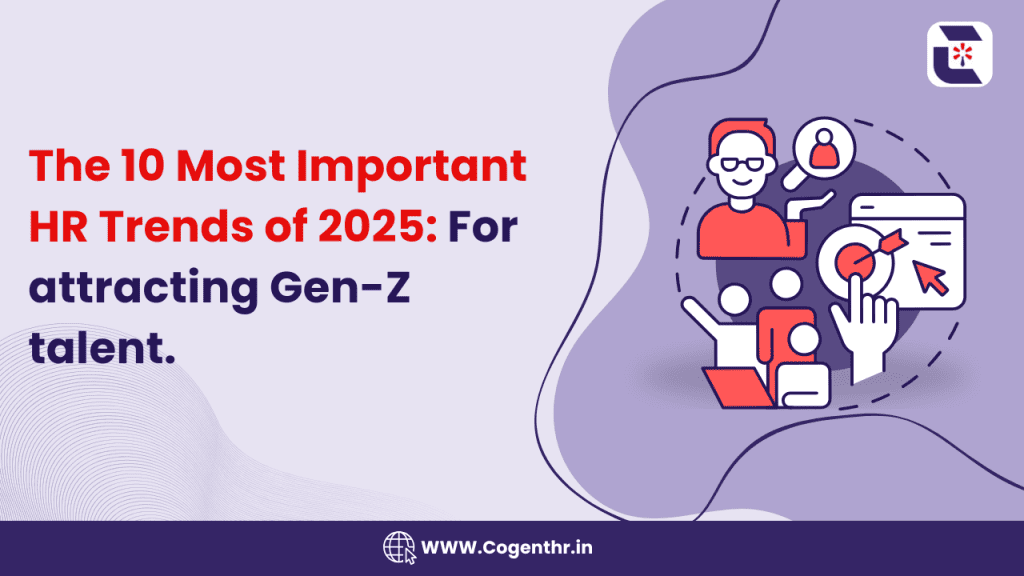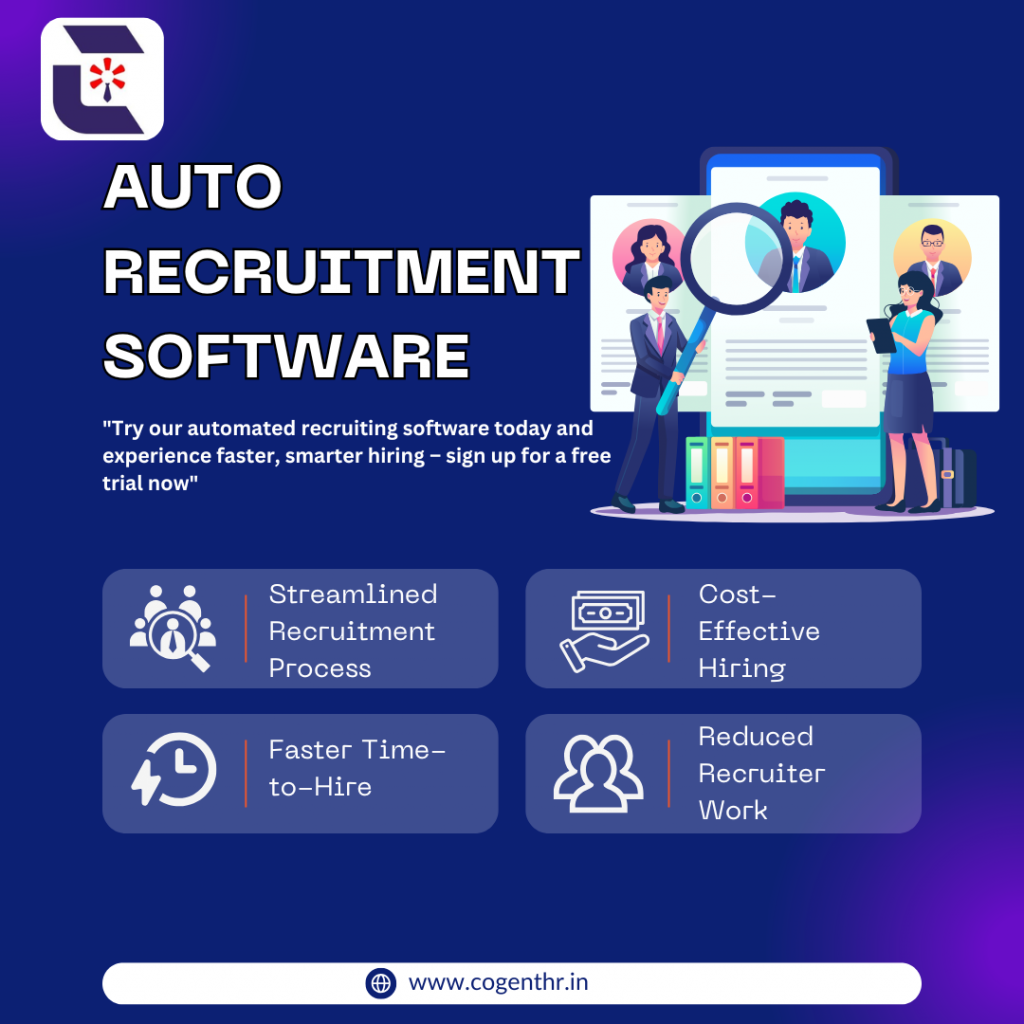How will HR advance in 2025?
What then new trends will affect the way of Company to attracting, engaging and retaining talent?
With rapidly changing trends and pressures upon all businesses around the globe, HR leaders are also responsible for anticipating and staying ahead of employee expectations, developments in technology and evolving labor market conditions.
We at Cogent Solutions follow the latest HR trends and workforce developments in order to keep businesses competitive. This article that discusses the top 10 most important HR trends of 2025 including employee wellbeing, Gen-Z expectations and more will help you adapt to these changes proactively. Are you ready to Evolve your HR practices?
Let’s dive in!

10 most important HR trends of 2025
1. AI & Automation in Recruitment and HR Processes
AI is transforming how HR departments function, making processes more efficient and data-driven. Key HR trends in 2025 include:
- Automated resume screening that shortlists candidates based on job descriptions, and skill assessments test or reduces hiring time.
- Predictive analytics for identifying potential employee attrition and improving talent management.
With Automation handling repetitive HR tasks, professionals can focus on strategic decision-making and increase human connections. that fail to prioritize employee well-being risk higher turnover rates and lower productivity levels. Quora
2. Employee Experience (EX) & Workplace Culture Evolution
Employee experience (EX) is becoming a important differentiator for companies aiming to retain top talent. Organizations are focusing on:
- Redesigning office spaces to be more collaborative and engaging.
- Using HR tech to personalize the employee journey, from onboarding to career development.
- Encouraging open communication, ensuring employees feel their importance in company.
Also Read: Struggling to find the right candidates in your large database? 2025
3. Hybrid Work & Flexible Work Arrangements
The post-pandemic workplace has solidified hybrid and flexible work as the new start. In 2025, organizations are:
- Offering customizable work models, allowing employees to choose between in-office, remote, or online setups.
- Implementing digital collaboration tools to maintain productivity in distributed teams.
Flexible work arrangements not only improve job satisfaction but also expand talent pools.
Also Read: How Staffing Agencies Can Streamline Hiring with Recruitment Software.

4. Skills-Based Hiring & Workforce Upskilling
Traditional degree-based hiring is giving way to a skills-first approach. Companies are prioritizing:
- Skill-based recruitment over formal degree-based hiring.
- Internal mobility programs, allowing employees to reskill and move into new roles within the organization.
This shift ensures that companies have graceful workforces ready to adapt to technological advancements.
5. The Rise of HR Analytics & Data-Driven Decision Making
HR analytics is revolutionizing talent management by providing deep insights into employee behavior and workforce trends. In 2025, organizations are Utilized:
- People analytics to measure engagement, performance, and productivity.
- Data-driven hiring strategies, using Automation insights to predict candidate success.
By making HR decisions based on data, organizations can optimize hiring, improve employee satisfaction, and enhance workforce planning.
6. Diversity, Equity & Inclusion (DEI) as a Business Priority
Diversity and inclusion are no longer just compliance requirements—they are strategic advantages. Companies are strengthening their DEI initiatives by:
- Implementing AI-driven unbiased hiring tools to minimize recruitment biases.
- Creating inclusive workplace cultures that celebrate diversity in gender, race, age, and neurodiversity.
- Setting measurable DEI goals and tracking progress using HR analytics.
A diverse workforce fosters innovation, improves decision-making, and enhances company reputation.
7.Prioritizing Employee Wellbeing & Mental Health
Employee wellbeing is no longer just a corporate benefit—it’s a business imperative. Companies recognize that a healthy workforce directly impacts productivity, engagement, and retention. In 2025, organizations are investing in:
- Holistic well-being programs that include physical, mental, and financial wellness.
- Mental health support includes in-house therapists, stress management programs, and mental health days.
- Flexible policies including remote work options, four-day workweeks, and customized schedules to reduce burnout.
Organizations that fail to prioritize employee well-being risk higher turnover rates and lower productivity levels.
8. Employer Branding & Talent Attraction in a Competitive Market
In a highly competitive job market, strong employer branding is crucial for attracting and retaining top talent. In 2025, companies are investing in:
- Authentic employer branding through employee testimonials and workplace culture showcases.
- Leveraging social media to highlight company values, culture, and career growth opportunities.
- Offering competitive benefits that align with employee priorities, such as career development and flexible work options.
A compelling employer brand helps organizations stand out and attract the right talent.
9. Compliance & Evolving Labor Laws
HR professionals must stay updated on regulatory changes to avoid legal pitfalls. In 2025, key compliance trends include:
- Automation of compliance tracking through HR software.
- Adapting to new labor laws regarding gig workers, remote employees, and workplace equity.
- Ensuring ethical AI usage in hiring and HR analytics.
Staying proactive with legal compliance protects organizations from fines, lawsuits, and reputational damage.
10. The Impact of Gen-Z in the Workforce
Gen-Z employees, born between 1997 and 2012, are reshaping workplace expectations. Employers must adapt to:
- Demand for purpose-driven work, emphasizing corporate social responsibility (CSR) and sustainability.
- Preference for digital-first workplaces, requiring seamless HR tech integration.
- Transparent communication, as Gen-Z values honest feedback and workplace inclusivity.
To attract and retain Gen-Z talent, organizations must embrace flexibility, inclusivity, and digital innovation.
Conclusion
The HR landscape in 2025 is shaped by technology, employee-centric policies, and evolving workforce demographics. Companies that proactively adopt these trends will gain a competitive edge in attracting, engaging, and retaining top talent.
At Cogent Solutions, we understand the importance of staying ahead in the ever-changing HR world. Our solutions help organizations streamline recruitment, enhance candidate experience, and adapt to the latest industry trends. By embracing innovation, prioritizing employee wellbeing, and fostering an inclusive workplace, businesses can build a future-ready workforce that thrives in the modern world of work.
Want to stay ahead of HR trends? Explore how Cogent Solutions can help your organization transform hiring in 2025 and beyond!
Free Auto Recruitment Software